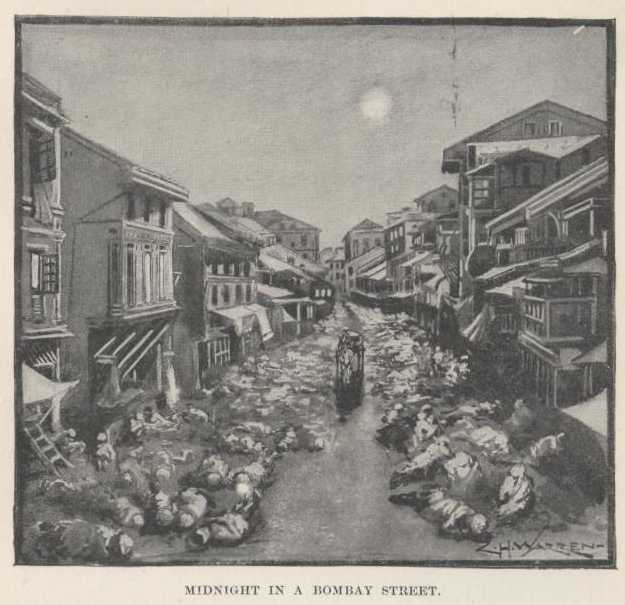Always before, we had driven through streets that were multitudinous and tumultuous with picturesque native life, but now there was nothing of that. We seemed to move through a city of the dead. There was hardly a suggestion of life in those still and vacant streets. Even the crows were silent. But everywhere on the ground lay sleeping natives-hundreds and hundreds. They lay stretched at full length and tightly wrapped in blankets, heads and all. Their attitude and their rigidity counterfeited death.

The plague was not in Bombay then, but it is devastating the city now. The shops are deserted, now, half of the people have fled, and of the remainder the smitten perish by shoals every day. No doubt the city looks now in the daytime as it looked then at night. When we had pierced deep into the native quarter and were threading its narrow dim lanes, we had to go carefully, for men were stretched asleep all about and there was hardly room to drive between them. And every now and then a swarm of rats would scamper across past the horses' feet in the vague light—the forbears of the rats that are carrying the plague from house to house in Bombay now. The shops were but sheds, little booths open to the street; and the goods had been removed, and on the counters families were sleeping, usually with an oil lamp present. Recurrent dead watches, it looked like.
...
Then again the deep silence, the skurrying rats, the dim forms stretched everywhere on the ground; and on either hand those open booths counterfeiting sepulchres, with counterfeit corpses sleeping motionless in the flicker of the counterfeit death lamps. And now, a year later, when I read the cablegrams I seem to be reading of what I myself partly saw—saw before it happened—in a prophetic dream, as it were. One cablegram says, "Business in the native town is about suspended. Except the wailing and the tramp of the funerals. There is but little life or movement. The closed shops exceed in number those that remain open." Another says that 325,000 of the people have fled the city and are carrying the plague to the country. Three days later comes the news, "The population is reduced by half." The refugees have carried the disease to Karachi; "220 cases, 214 deaths." A day or two later, "52 fresh cases, all of which proved fatal."
The plague carries with it a terror which no other disease can excite; for of all diseases known to men it is the deadliest—by far the deadliest. "Fifty-two fresh cases—all fatal." It is the Black Death alone that slays like that. We can all imagine, after a fashion, the desolation of a plague-stricken city, and the stupor of stillness broken at intervals by distant bursts of wailing, marking the passing of funerals, here and there and yonder, but I suppose it is not possible for us to realize to ourselves the nightmare of dread and fear that possesses the living who are present in such a place and cannot get away. That half million fled from Bombay in a wild panic suggests to us something of what they were feeling, but perhaps not even they could realize what the half million were feeling whom they left stranded behind to face the stalking horror without chance of escape. Kinglake was in Cairo many years ago during an epidemic of the Black Death, and he has imagined the terrors that creep into a man's heart at such a time and follow him until they themselves breed the fatal sign in the armpit, and then the delirium with confused images, and home-dreams, and reeling billiard-tables, and then the sudden blank of death: